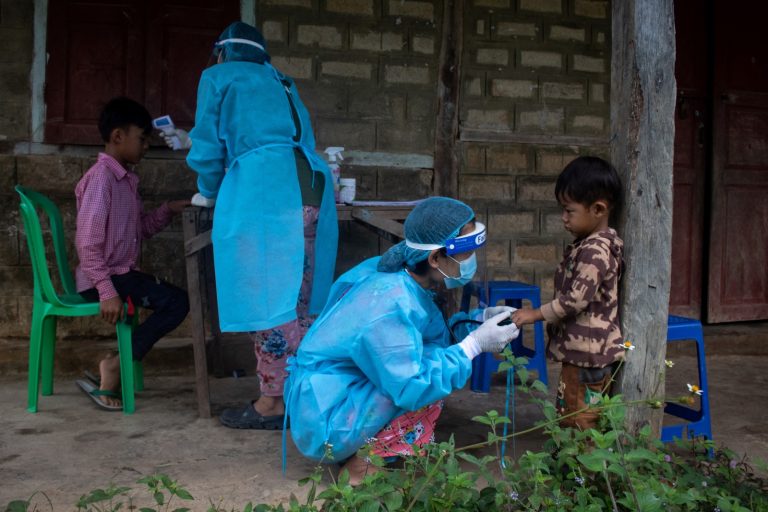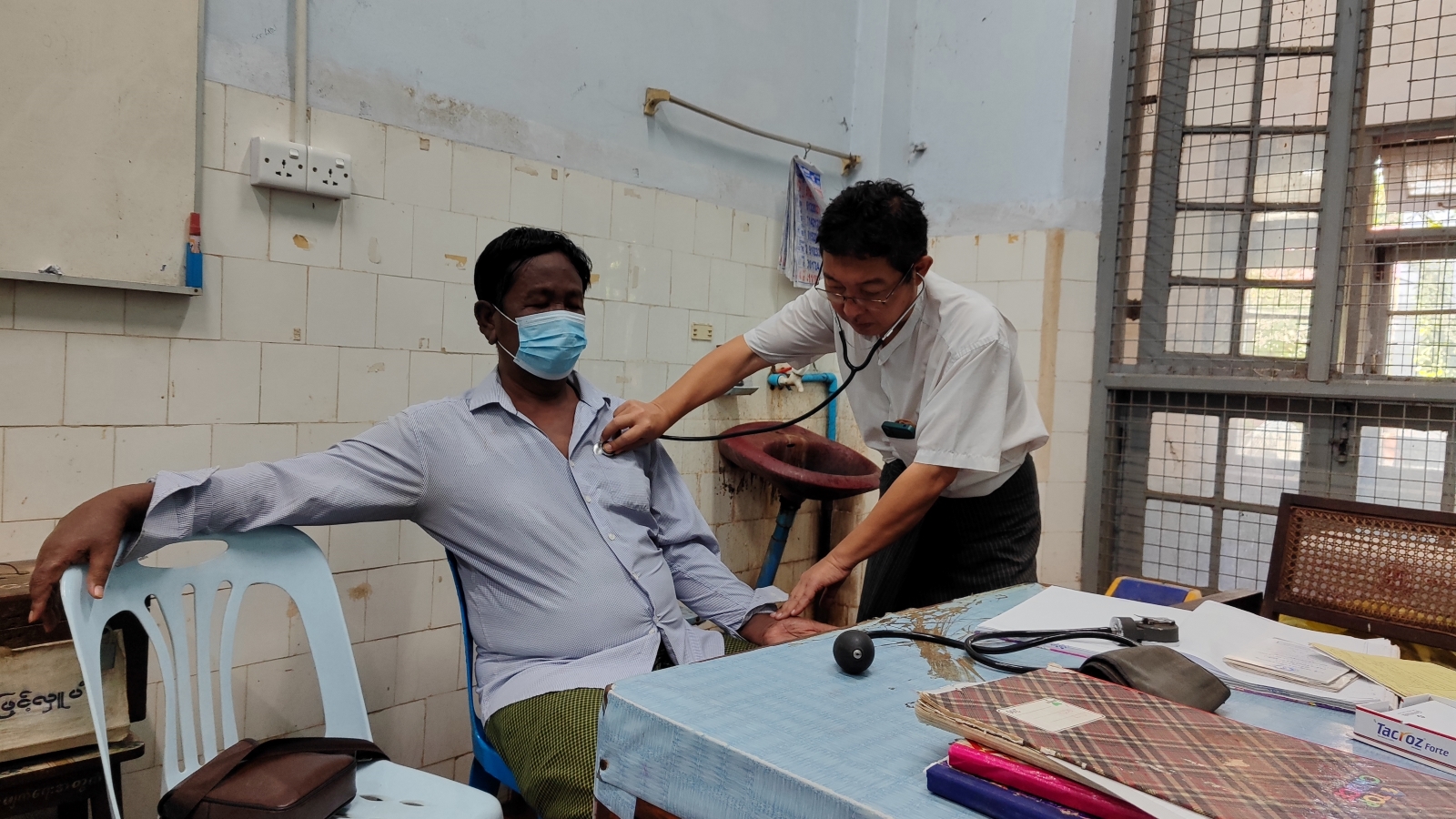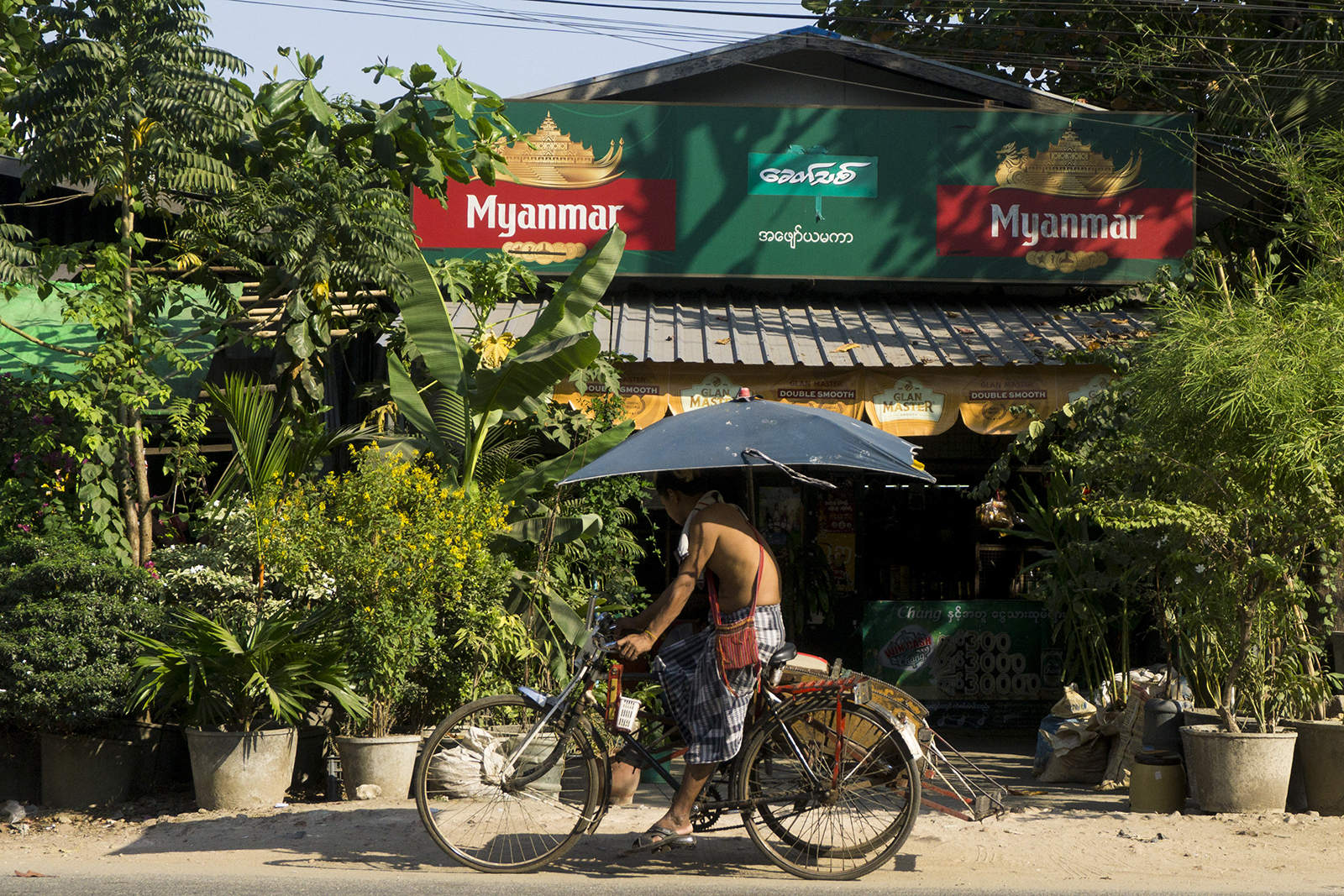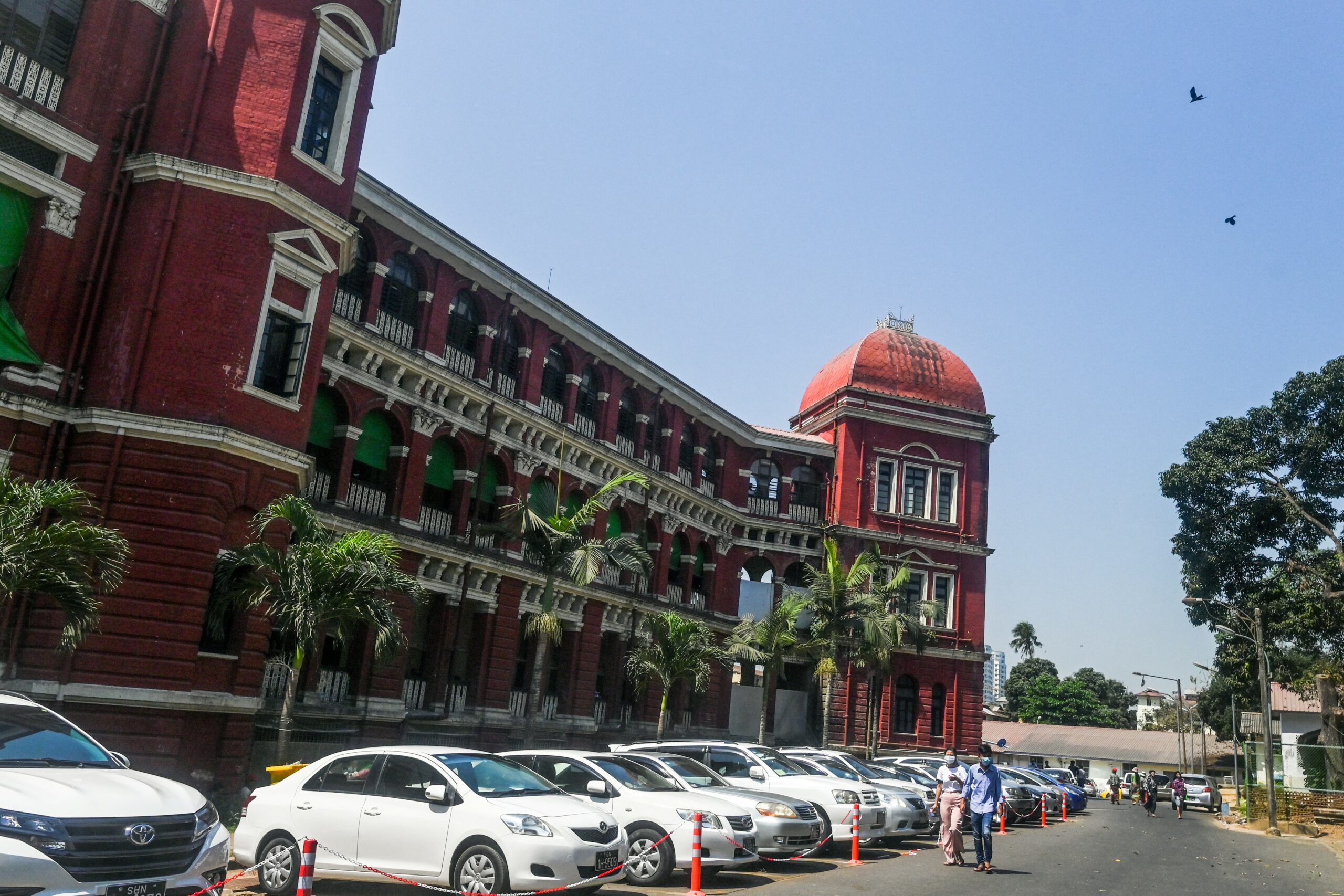The ready availability of cheap alcohol has created a national problem that Myanmar’s underfunded public health system is having difficulty addressing.
By HANS HULST | FRONTIER
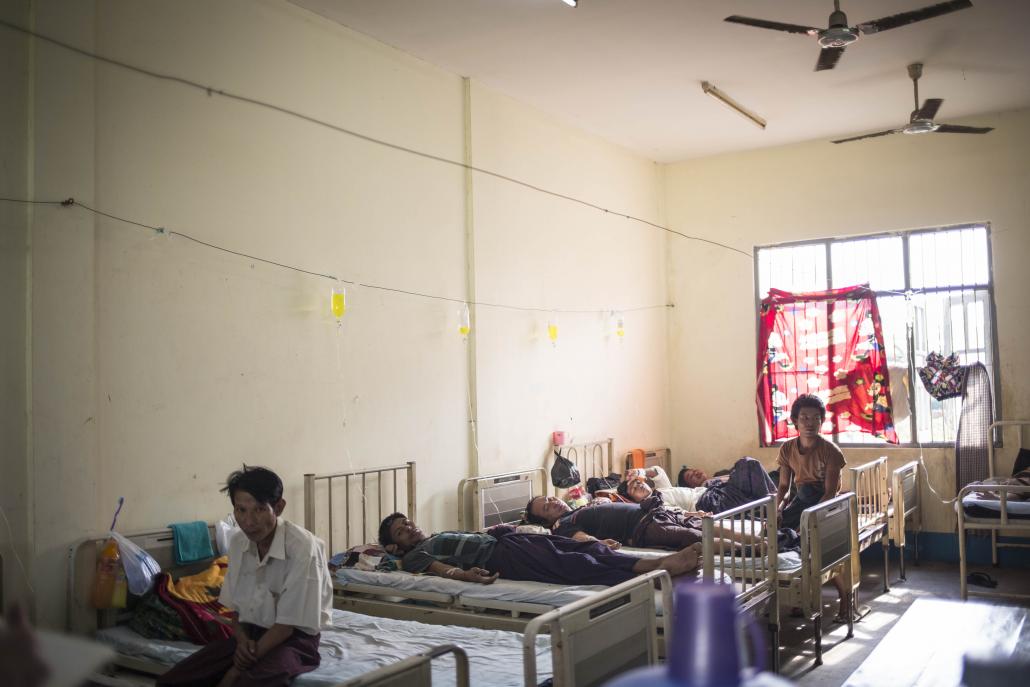
The dormitory of the alcohol unit at Yangon Mental Hospital. (Ann Wang / Frontier)
When Ko Thaw Zin Aung arrived at the house of U Aung Kyaw Linn on the night of December 9, his friend’s bloated body was on a bed and covered with a bamboo mat, as is tradition in Myanmar. U Aung Kyaw Linn had died unexpectedly in his sleep. He was 41.
For Ko Thaw Zin Aung the reason for his passing was all too clear.
“My friend had a alcohol problem since he was 18. He drank everything: beer, rum, rice wine,” he said. “First he only took alcohol in the morning and the evening. After he was hospitalised for a liver problem, he started to drink all day long. To medicate himself against the pain, he told me.”
Support more independent journalism like this. Sign up to be a Frontier member.
U Aung Kyaw Linn was a yet tha mar, an alcoholic, in a country where education on the risks of alcohol abuse is lacking, where cheap booze, often of dodgy origin, is readily available, and where poverty and dark memories of the junta years provide ample reason for wanting to forget. Social pressure is another factor why boys start drinking at an early age.
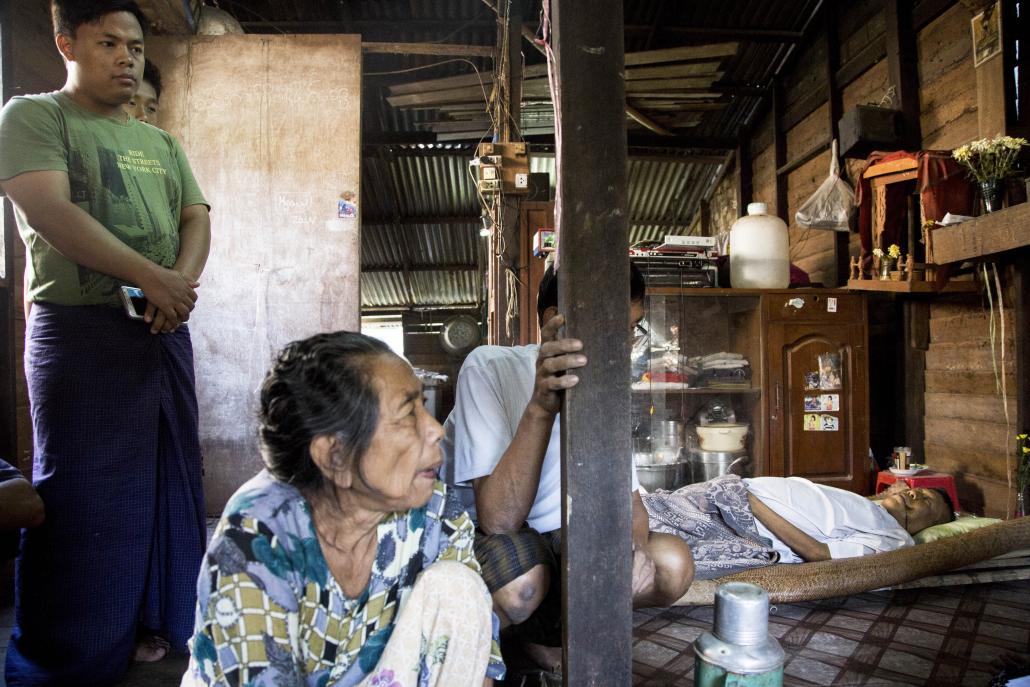
U Aung Kyaw Linn, a 41-year-old alcoholic, on his deathbed in his family home. (Ann Wang / Frontier)
Ko Thaw Zin Aung does not drink because he keeps the fifth Buddhist precept, which forbids intoxication.
Religion did not stop the alcoholics that are being treated in the Mental Health Hospital in Yangon’s East Dagon Township. The hospital is one of only two such institutions in Myanmar. It can accommodate 1,555 inpatients.
Schizophrenic disorders are the most common ailment treated at the hospital, said director Dr Kyi Soe. “But we also have a alcoholics unit where we can treat 186 inpatients. We don’t have a waiting list and try to accommodate everybody. If needed, we put extra beds in.”
Male nurse Ko Zehar’s duties including monitoring a locked dormitory for up to 20 recovering alcoholics while they are detoxing. The door has to be locked because the men are sometimes aggressive and there are only three nurses on duty.
“Some are delirious or suffer from alcohol psychosis,” said Ko Zehar. “If they get aggressive it is hard to control them. We need several staff to restrain patients. It can be quite dangerous. Sometimes patients will bite me. They don’t know what they’re doing and will pay respect to me after they are sober again.”
More violent cases are put in room number 5, a building which is locked and has no mattresses on the bed frames. The grim-looking men in this punishment chamber can return to the dormitory after they have recovered from their violent fits, said Ko Zehar.
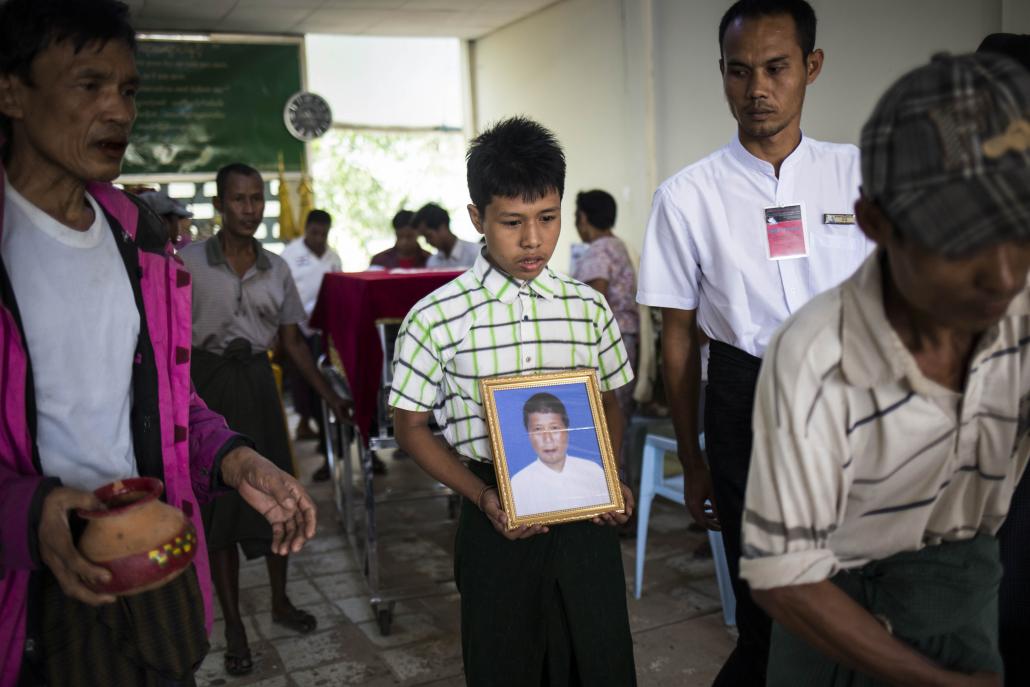
One of U Aung Kyaw Linn’s sons carries a photo of him on the day of his funeral. (Ann Wang / Frontier)
Detox, no counselling
The ‘treatment’ administered to alcoholics in Yangon Mental Hospital is straightforward. First they detox for three days, during which they will get multivitamin drips, because the electrolyte balance of the often underfed patients has been disturbed. They will also be given sedatives, to keep them calm. Patients can stay for ten days at a time. Poor patients don’t have to pay for medicine and meals. Richer patients have the option of upgrading themselves to better food and private rooms.
Mental counselling is limited to a one-hour interview in the ten-day program, said psychiatrist Dr Thi Thi Aye. “It is not enough. I would like to do more, but we don’t have enough staff and are overwhelmed with patients,” she said. “I think that the family should participate in the treatment of their relatives, but mostly they just abandon them. Some have financial difficulties and can’t visit.”
“Daw Aung San Suu Kyi has told people to stop betel spitting. People listen to her. I hope she will use her influence to put alcoholism on the agenda.”
Another problem is that the motivational interviews Dr Thi Thi Aye is conducting fail to strike a chord. The reason is a lack of education, she said. “Patients often don’t understand our approach. Only a few do and don’t return after they are rehabilitated.”
Two thirds of the recovering alcoholics in the unit are recidivists. One of them is U Ohn Myint, a construction worker who has been battling his alcohol demons for forty years. It was his third stay in the unit, the bony-faced 58-year-old said.
“I drink whisky and army rum and I just can’t stop. I don’t need to eat, but I need to drink. I will start drinking at 2pm and consume about one and a half litres of hard liquor a day. Now I have a real desire to end my addiction. This time I will be successful!”
Male nurse Ko Zehar is disheartened by the frequent relapses and the lack of resources available to treat the patients. Staffing is a problem because many nursing graduates do not want to work with the ‘bad people’ to whom he and his colleagues provide care.
“The work can get too much sometimes,” said Ko Zehar. “Some come in with injuries from accidents. They have bad personal hygiene and we need to train them to start eating again. Still, I want to work here the rest of my life. I feel I understand them.”
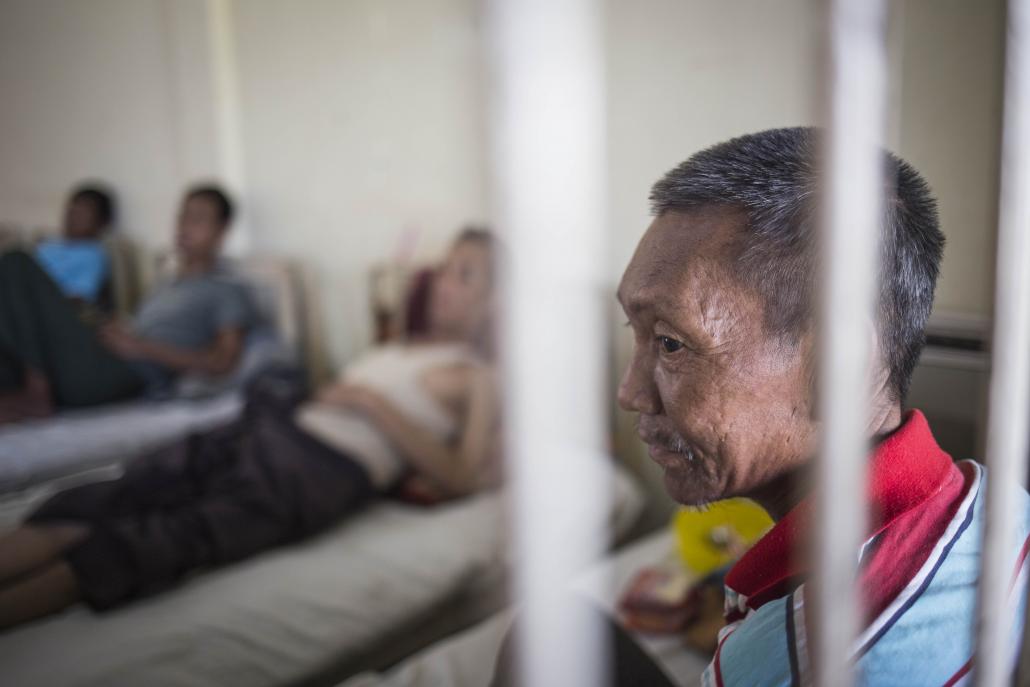
U Ohn Myint has been battling his alcohol demons for 40 years. He is now in detox for the third time at Yangon Mental Hospital. (Ann Wang / Frontier)
Alcohol epidemic
On the other side of the city, at Pun Hlaing Siloam Hospital in Hlaing Tharyar Township, Dr Anila Paul is starting an intensive outpatient program to treat people with substance abuse and dependency problems.
Although the latest reliable data from the World Health Organisation is from 2009, Dr Paul said she was confident on the basis of her experience to say that Myanmar has “a huge health problem” with alcoholism.
“The majority of people who drink in Myanmar are hazardous drinkers,” the addiction and rehabilitation specialist said. “They will drink more than the five standard units a day and many of them quickly transition into dependency. Too many young people are dying from this.”
Dr Paul cited a number of reasons for Myanmar’s alcohol epidemic. Easy accessibility and the fact that social drinking starts at a young age are key factors, but irresponsible behaviour by waiters and bar tenders is another reason. “Bar tenders keep pouring drinks in Myanmar, even if you are drunk already,” said Dr Paul. “Some bar tenders and taxi drivers will drink during their shifts.”
Pun Hlaing Siloam Hospital has established a health risk assessment tool that it is keen to share with other hospitals. The tool will provide data that will create a better picture of the scale of the problem and there’s hope it will help to persuade the incoming government to take action.
“I am not aware of any National League for Democracy policy on alcohol,” said Dr Paul. “But Daw Aung San Suu Kyi has told people to stop betel spitting. People listen to her. I hope she will use her influence to put alcoholism on the agenda and come up with fitting legislation. Prohibition doesn’t work. Nobody says: stop drinking. But drink smart. We need more education to create awareness.”
Dr Paul is training nurses to intervene when they encounter alcoholics, of whom 80 percent are diagnosed with multiple diseases. Pun Hlaing Siloam also started cooperating with a domestic airline that has asked it to develop a program for breath-testing pilots.
The hospital, where dormitory beds including medicine for poor patients are available for US$10 a night, places heavy emphasis on counselling. “Addiction is a very selfish disease with psychological, social and religious dimensions. You have to work on all aspects of the problem to be able to be successful,” said Dr Paul.
aw_-_alcoholic_2.jpg

Ann Wang / Frontier
Group therapy
For composer U Myat Thu it took thirty years and several bouts of alcoholism before he was able to stop drinking.
“I started drinking when I was 14,” he said in a downtown Yangon restaurant after a group therapy session. “My friends stimulated me to drink local drink booze. I soon became a regular drinker. But I first got addicted to cough syrup. When the government banned the sale of cough syrup, I switched to heroin in the 90s. You could say I am addiction prone.”
To support his addictions, U Myat Thu started to deal in drugs. “My whole life was corrupt. My family was desperately trying to stop me. I am so lucky I was never caught.”
U Myat Thu managed to kick his destructive drug habit after a stay in a private rehabilitation facility, only to start drinking again. He just substituted one substance for another.
“I have the alcohol disease,” he said. “I can stay off the booze for one month. But after I have my first drink again, I can’t stop. There is some kind of fear inside me, since the day I have been born. I don’t feel comfortable. I need something to help me.”
U Myat Thu was able to stop drinking after enrolling in one of Myanmar’s few weekly group therapy programs. He has been sober for two years.
“Without the program it would be very difficult to stay sober. We’re meeting twice a week and we share our stories. It’s helping a lot,” he said.
For U Aung Kyaw Linn, it is too late for counselling or group therapy. Ko Thaw Zin Aung tried to persuade his friend to stop drinking, but he did not listen. His widowed wife, who has three sons and no income to care for them, often argued with her husband about his drinking. The arguments usually ended with her leaving the family home to stay with a friend. Nothing seemed to help.
“The family once sent him to a monastery, to clean up,” said Ko Thaw Zin Aung. “That helped for ten days. Then he started drinking again; he would just hide his bottles somewhere. I’m very sad and so sorry that he died.”
For privacy reasons the names of Ko Zehar and U Myat Thu have been changed.



